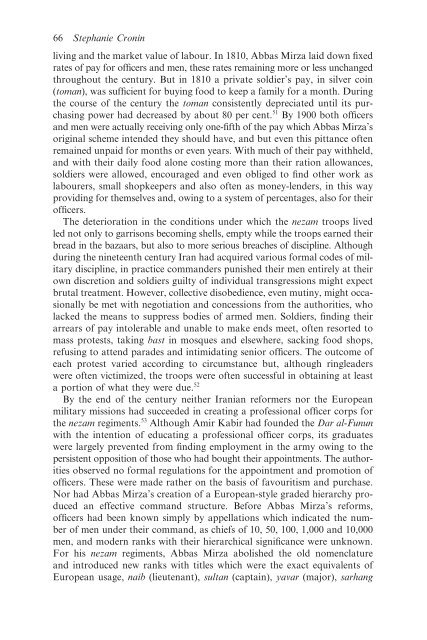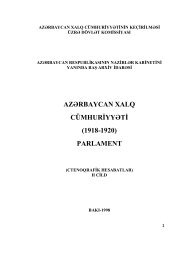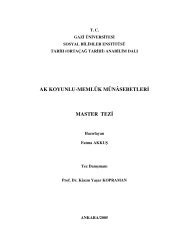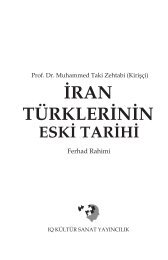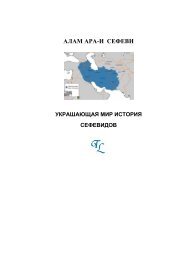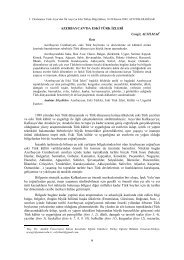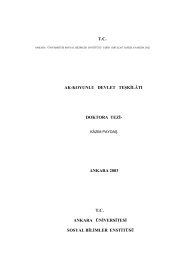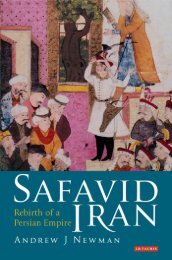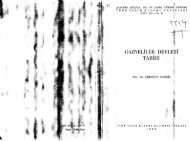War and Peace in Qajar Persia: Implications Past and ... - Oguzlar.az
War and Peace in Qajar Persia: Implications Past and ... - Oguzlar.az
War and Peace in Qajar Persia: Implications Past and ... - Oguzlar.az
- No tags were found...
You also want an ePaper? Increase the reach of your titles
YUMPU automatically turns print PDFs into web optimized ePapers that Google loves.
66 Stephanie Cron<strong>in</strong>liv<strong>in</strong>g <strong>and</strong> the market value of labour. In 1810, Abbas Mirza laid down fixedrates of pay for officers <strong>and</strong> men, these rates rema<strong>in</strong><strong>in</strong>g more or less unchangedthroughout the century. But <strong>in</strong> 1810 a private soldier’s pay, <strong>in</strong> silver co<strong>in</strong>(toman), was sufficient for buy<strong>in</strong>g food to keep a family for a month. Dur<strong>in</strong>gthe course of the century the toman consistently depreciated until its purchas<strong>in</strong>gpower had decreased by about 80 per cent. 51 By 1900 both officers<strong>and</strong> men were actually receiv<strong>in</strong>g only one-fifth of the pay which Abbas Mirza’sorig<strong>in</strong>al scheme <strong>in</strong>tended they should have, <strong>and</strong> but even this pittance oftenrema<strong>in</strong>ed unpaid for months or even years. With much of their pay withheld,<strong>and</strong> with their daily food alone cost<strong>in</strong>g more than their ration allowances,soldiers were allowed, encouraged <strong>and</strong> even obliged to f<strong>in</strong>d other work aslabourers, small shopkeepers <strong>and</strong> also often as money-lenders, <strong>in</strong> this wayprovid<strong>in</strong>g for themselves <strong>and</strong>, ow<strong>in</strong>g to a system of percentages, also for theirofficers.The deterioration <strong>in</strong> the conditions under which the nezam troops livedled not only to garrisons becom<strong>in</strong>g shells, empty while the troops earned theirbread <strong>in</strong> the b<strong>az</strong>aars, but also to more serious breaches of discipl<strong>in</strong>e. Althoughdur<strong>in</strong>g the n<strong>in</strong>eteenth century Iran had acquired various formal codes of militarydiscipl<strong>in</strong>e, <strong>in</strong> practice comm<strong>and</strong>ers punished their men entirely at theirown discretion <strong>and</strong> soldiers guilty of <strong>in</strong>dividual transgressions might expectbrutal treatment. However, collective disobedience, even mut<strong>in</strong>y, might occasionallybe met with negotiation <strong>and</strong> concessions from the authorities, wholacked the means to suppress bodies of armed men. Soldiers, f<strong>in</strong>d<strong>in</strong>g theirarrears of pay <strong>in</strong>tolerable <strong>and</strong> unable to make ends meet, often resorted tomass protests, tak<strong>in</strong>g bast <strong>in</strong> mosques <strong>and</strong> elsewhere, sack<strong>in</strong>g food shops,refus<strong>in</strong>g to attend parades <strong>and</strong> <strong>in</strong>timidat<strong>in</strong>g senior officers. The outcome ofeach protest varied accord<strong>in</strong>g to circumstance but, although r<strong>in</strong>gleaderswere often victimized, the troops were often successful <strong>in</strong> obta<strong>in</strong><strong>in</strong>g at leasta portion of what they were due. 52By the end of the century neither Iranian reformers nor the Europeanmilitary missions had succeeded <strong>in</strong> creat<strong>in</strong>g a professional officer corps forthe nezam regiments. 53 Although Amir Kabir had founded the Dar al-Fununwith the <strong>in</strong>tention of educat<strong>in</strong>g a professional officer corps, its graduateswere largely prevented from f<strong>in</strong>d<strong>in</strong>g employment <strong>in</strong> the army ow<strong>in</strong>g to thepersistent opposition of those who had bought their appo<strong>in</strong>tments. The authoritiesobserved no formal regulations for the appo<strong>in</strong>tment <strong>and</strong> promotion ofofficers. These were made rather on the basis of favouritism <strong>and</strong> purchase.Nor had Abbas Mirza’s creation of a European-style graded hierarchy producedan effective comm<strong>and</strong> structure. Before Abbas Mirza’s reforms,officers had been known simply by appellations which <strong>in</strong>dicated the numberof men under their comm<strong>and</strong>, as chiefs of 10, 50, 100, 1,000 <strong>and</strong> 10,000men, <strong>and</strong> modern ranks with their hierarchical significance were unknown.For his nezam regiments, Abbas Mirza abolished the old nomenclature<strong>and</strong> <strong>in</strong>troduced new ranks with titles which were the exact equivalents ofEuropean usage, naib (lieutenant), sultan (capta<strong>in</strong>), yavar (major), sarhang


